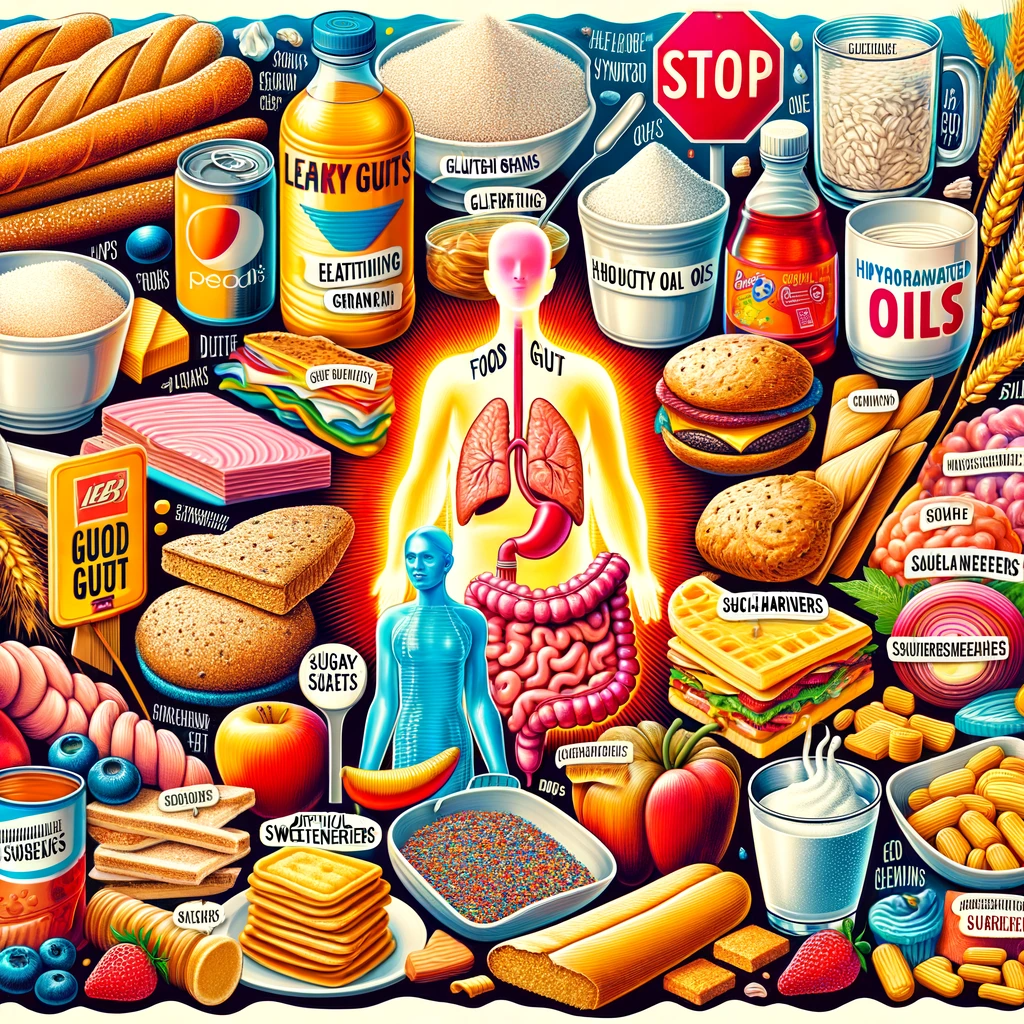In the realm of maintaining optimal health, the significance of gut health cannot be overstated. The gut acts as a crucial barrier, safeguarding our internal systems from external elements.
However, certain foods have the potential to disrupt the delicate balance of our gut, leading to a condition known as leaky gut syndrome. This condition is characterized by an increased permeability of the intestinal lining, allowing harmful substances to enter the bloodstream and trigger inflammation throughout the body.
The purpose of this article is to shed light on the culprits behind leaky gut syndrome, exposing the foods that can wreak havoc on gut health. By unveiling the detrimental effects of gluten, sodium overload, hydrogenated oils, artificial sweeteners, excessive sugar intake, and other gut-wrecking substances, individuals can make informed dietary choices and strive towards maintaining a healthy gut.
Gluten and Leaky Gut Syndrome
The link between gluten and leaky gut syndrome has been well-established. Gluten-containing grains such as wheat, barley, and rye are known triggers for this gastrointestinal condition. Gluten is a protein found in these grains, and it can increase the levels of Zonulin, a protein that regulates gut permeability.
In individuals sensitive or intolerant to gluten, this can lead to a leaky gut. A leaky gut occurs when the intestinal lining becomes more permeable, allowing harmful substances to pass through into the bloodstream. This can result in inflammation, immune system activation, and various symptoms such as abdominal pain, bloating, and diarrhea.
Those with leaky gut syndrome are often advised to follow a gluten-free diet. This dietary change can help alleviate their symptoms and improve gut health. However, it is important for individuals with suspected leaky gut syndrome to consult with healthcare professionals for appropriate diagnosis and management.
Sodium Overload and Gut Health
A high intake of sodium poses significant risks to gut health. Excessive sodium consumption, often from processed foods, can have detrimental effects on the gut. Here are three reasons why sodium overload is harmful to gut health:
-
Overactive immune system: High sodium intake can lead to an overactive immune system. This can trigger inflammation in the gut, contributing to issues such as leaky gut syndrome.
-
Exacerbates autoimmune disorders: Sodium overload can exacerbate autoimmune disorders, which are characterized by an overactive immune response. This can further damage the gut lining and worsen gut health.
-
Increases risk of leaky gut: The excessive sodium in processed foods can contribute to the development of leaky gut syndrome. This condition occurs when the intestinal lining becomes permeable, allowing harmful substances to enter the bloodstream.
To maintain a healthy gut, it is crucial to limit sodium intake and opt for whole, unprocessed foods whenever possible.
Harmful Effects of Hydrogenated Oils
Discussing the harmful effects of hydrogenated oils on gut health, it is evident that these oils can have detrimental effects on the body.
Hydrogenated oils, which are commonly found in processed foods, contain trans fats that can damage the lining of the gut. These trans fats can worsen gut health and contribute to the development of leaky gut syndrome.
Leaky gut syndrome occurs when the lining of the intestines becomes damaged, leading to increased permeability and allowing harmful substances to enter the bloodstream.
By consuming hydrogenated oils, individuals are putting themselves at risk for exacerbating gut issues and experiencing the negative consequences associated with leaky gut syndrome.
Therefore, it is important to be mindful of the harmful effects of hydrogenated oils and make healthier dietary choices to support gut health.
Artificial Sweeteners and Gut Bacteria Balance
One potential contributor to an imbalance in gut bacteria is the excessive consumption of artificial sweeteners. These sugar substitutes are often found in low-calorie products and can disrupt the balance of gut bacteria. Here are three reasons why artificial sweeteners can negatively impact gut bacteria balance:
-
Altered Gut Microbiota: Artificial sweeteners have been shown to change the composition and diversity of gut bacteria. Studies have found that certain sweeteners, such as saccharin and sucralose, can lead to an overgrowth of harmful bacteria and a decrease in beneficial bacteria.
-
Gut Inflammation: Artificial sweeteners may contribute to gut inflammation, which can disrupt the integrity of the gut lining and lead to leaky gut syndrome. This inflammation can also trigger an immune response, further exacerbating gut issues.
-
Metabolic Changes: Research suggests that artificial sweeteners may alter the metabolism of gut bacteria, leading to an imbalance in the breakdown and absorption of nutrients. This disruption in metabolism can impact overall gut health and contribute to digestive problems.
Excessive Sugar Intake and Gut Health
Excessive sugar intake poses a significant threat to gut health, specifically by disrupting the balance of gut bacteria and compromising overall digestive function.
The overconsumption of sugar can lead to an imbalance in gut bacteria, favoring the growth of harmful bacteria while hindering the growth of beneficial bacteria. This disruption can have detrimental effects on the digestive system, as the balance of gut bacteria plays a crucial role in maintaining optimal digestive function.
Additionally, excessive sugar intake has been linked to gut issues such as bloating, gas, and diarrhea, as well as a potential cause of leaky gut syndrome.
Therefore, it is important to limit sugar intake and prioritize a balanced diet to support gut health and overall well-being.

